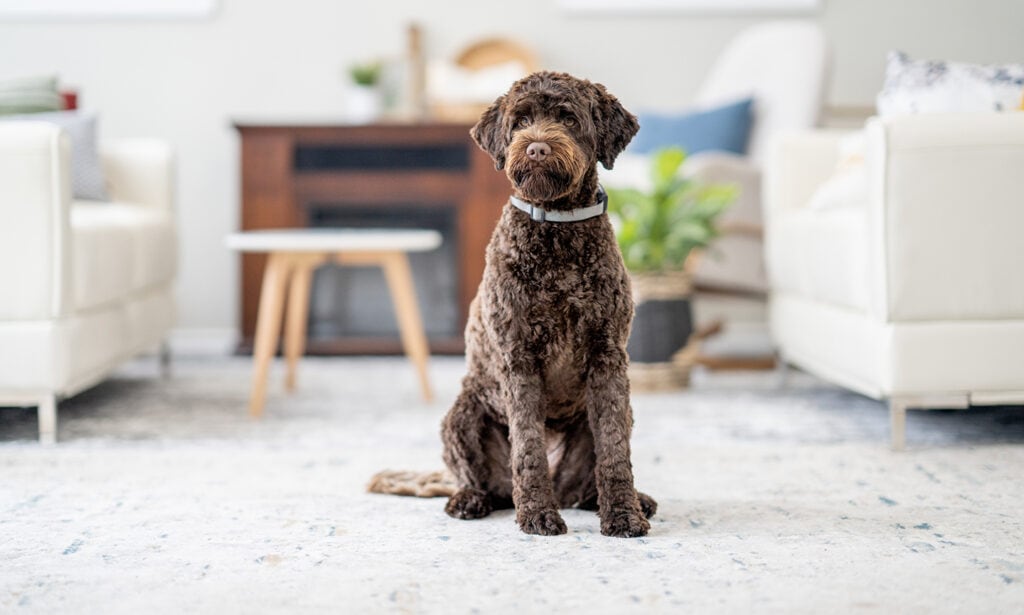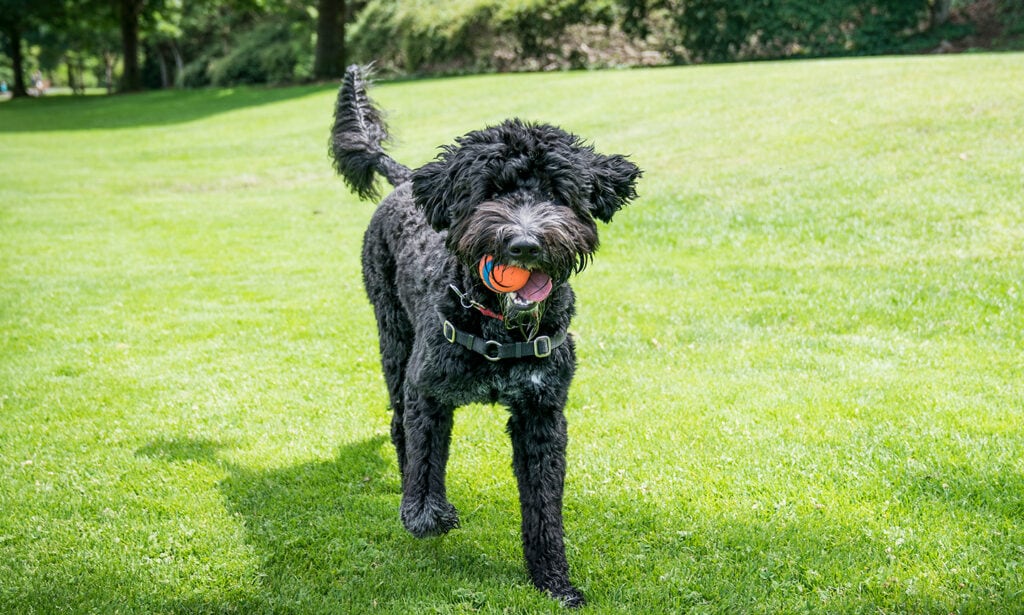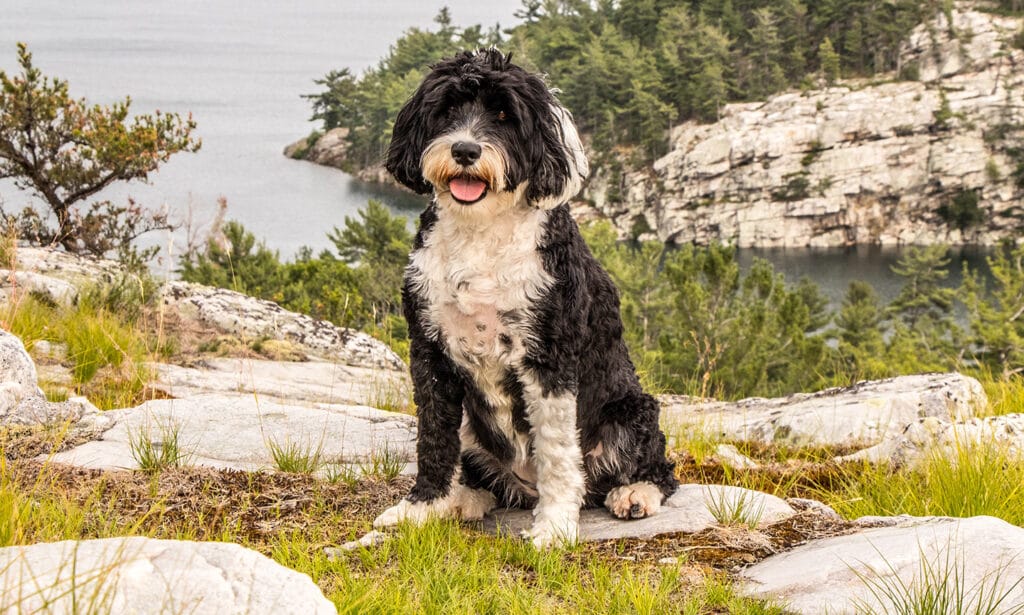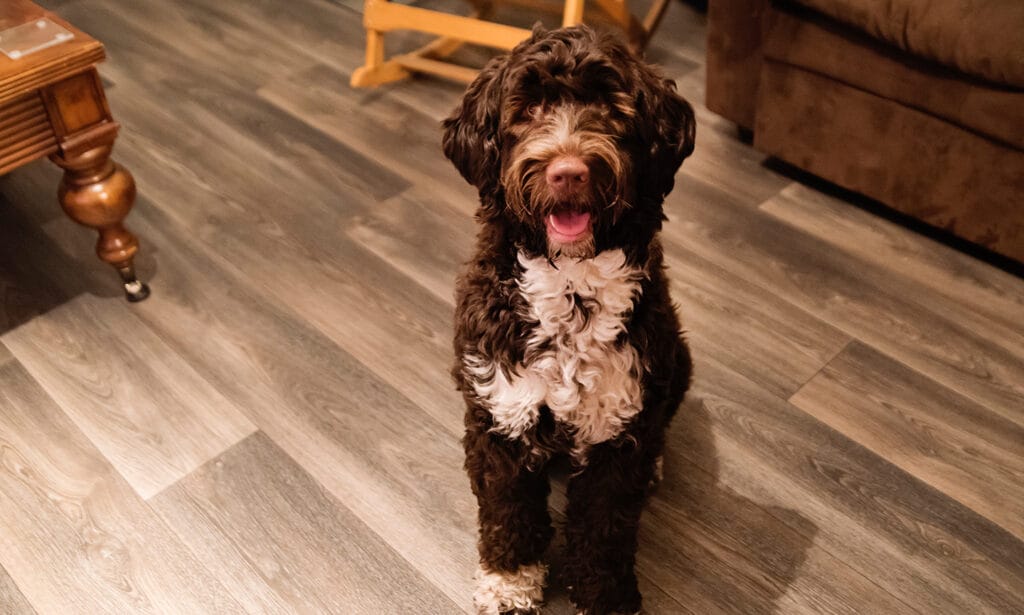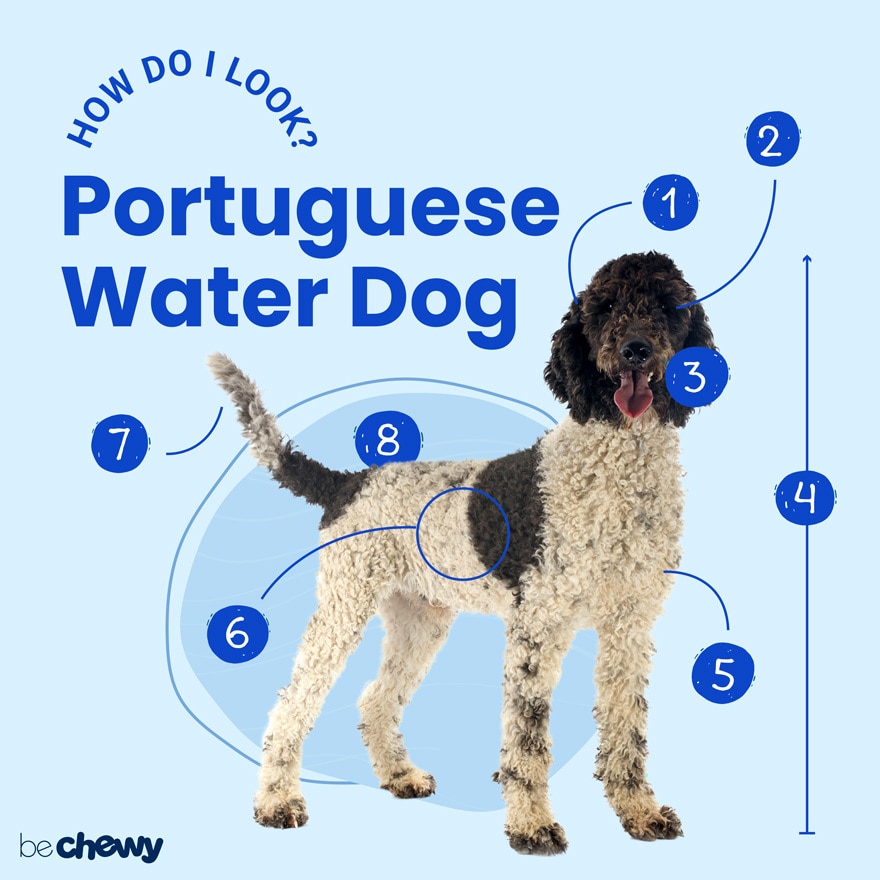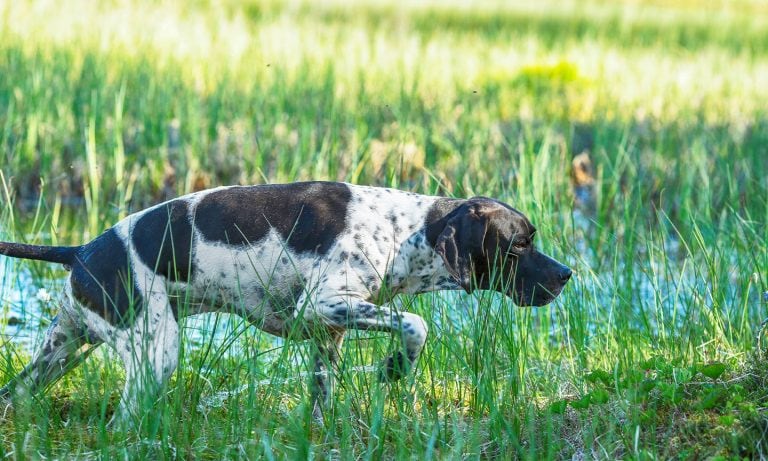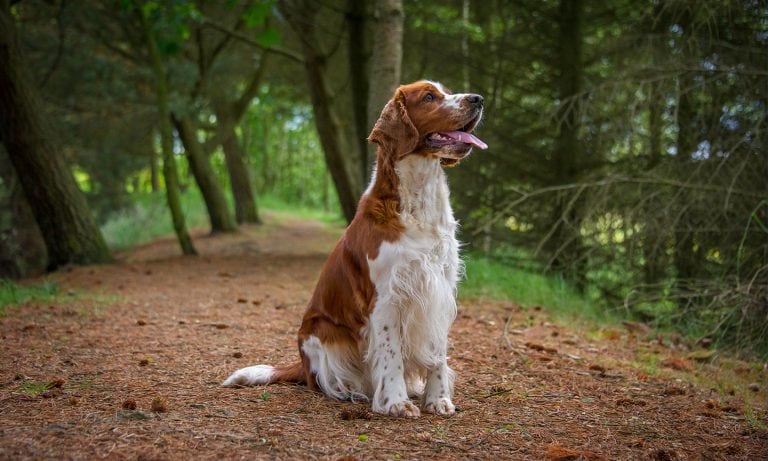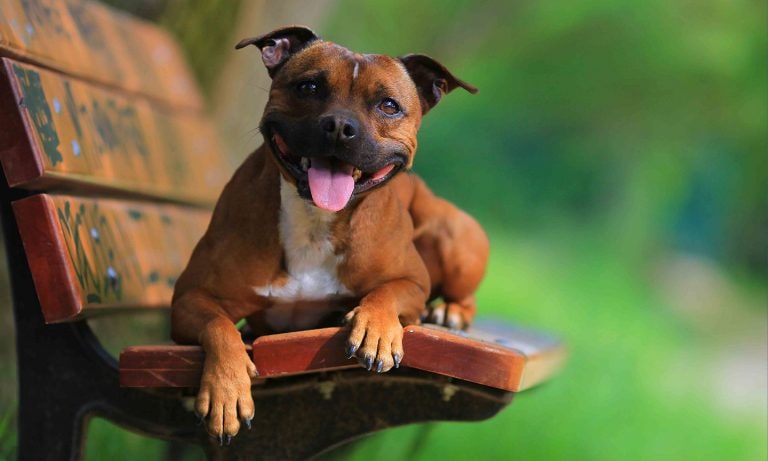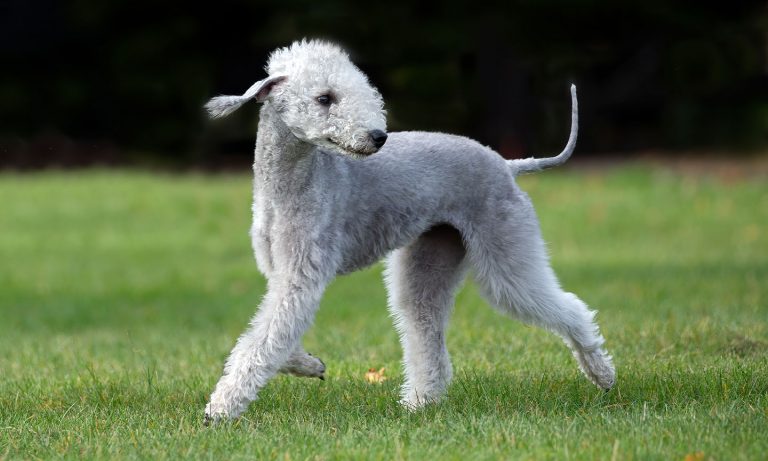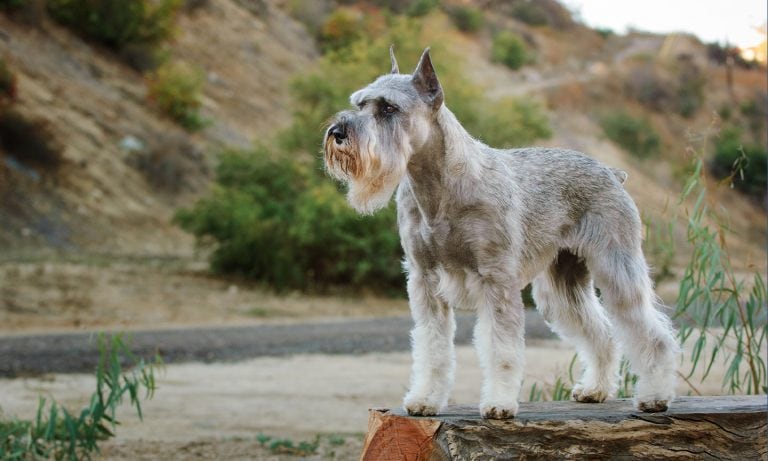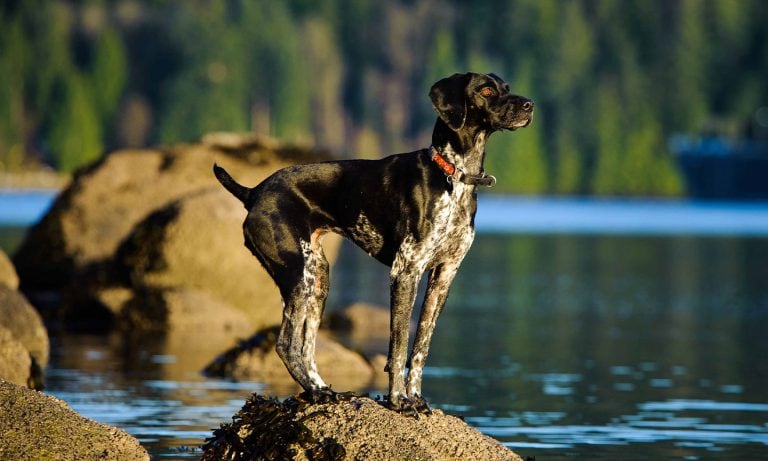If Olympic champion swimmer Michael Phelps were to assume canine form, he’d most likely be the Portuguese Water Dog. Originally bred to assist fishermen, these low-shedding, expert paddlers are affable hard workers who can get up to some mischief if not kept busy. No wonder they live their best lives as members of an active family—that’s why Bo and Sunny, a pair of Porties, fit right in when the Obamas welcomed them to the White House as “First Pets.” While there’s no requirement here to just add water (they are just fine in your dry land backyard), you will need to provide a lifestyle for a pup who’s up for more than just a walk around the block. Ready to dive into a relationship with a Portuguese Water Dog?
Breed Snapshot
Temperament:
DynamoSuper SmartPeople PleaserCoat Color:
BlackWhiteBrown
Best For
Originally bred to assist fishermen, Portuguese Water Dogs are best suited for highly active pet parents since they require near-constant physical and mental stimulation. Porties can live happily alongside kids, dogs and cats provided they were raised together from a young age.
Portuguese Water Dog Temperament
Portuguese Water Dogs are quintessential working dogs who have successfully transitioned to family pets over the centuries. These proud seafarers hail from the southern coast of Portugal, where they swam out to nets to help Portuguese fishermen retrieve their catch. You don’t need a boat, however, to befriend a Portie.
Porties typically have a friendly and kind temperament and are very loyal to their families. Meaning, they’ll likely shoot a suspicious glance or growl in the new deliveryman’s direction, but that’s as far as it goes. They have low biting tendencies and are generally good around strangers.
They also tend to get along great with other dogs and fairly well with cats and kids they grew up with. Still, they benefit from proper socialization early on (great excuse for a “Meet My Puppy” party with all your friends).
On the flip side, Porties are so smart and energetic, they crave constant mental stimulation and can get bored if left to their own devices. Pet parents can keep their dog from going to town on favorite footwear by engaging Porties in vigorous activity, indoors or out. Prepare to play fetch for hours on end with your tireless pet and keep them away from your belongings with an army of chew toys at their disposal. At the end of the day, as active and independent-minded as they can be, Porties are happiest when exercising with the family they love—all the better if that involves swimming in a lake, beach or pool.
How to Care for a Portuguese Water Dog
The Portuguese Water Dog breed is low shedding and often considered a good choice for people with allergies, but that doesn’t mean they’re low maintenance. They require regular grooming and plenty of stimulating activities to keep them happy and healthy. Fortunately, they tend to be friendly and adapt well to first-time pet parents with small children and other pets; as long as they’re getting all the other elements they need to flourish.
Portuguese Water Dog Health
The Portuguese Water Dog has a life expectancy of 11-13 years. They’re healthy in general, but can develop some of the same issues that plague dogs of similar size. They’re also prone to some congenital disorders, but good breeding practices have made this increasingly rare. Regardless, it’s wise to educate yourself about any potential health problems so you can keep your pet going strong.
- Eye Problems: Porties can be prone to cataracts where one or both eyes becomes progressively cloudy. Symptoms include changes in eye color or size and excessive eye rubbing. As cataracts can result in blindness, check with your vet about surgery as a possible treatment option. Progressive retinal atrophy (PRA) is another threat to the breed. This congenital condition, which can be identified with DNA testing, can lead to night blindness. There is currently no treatment, but dogs with loss of vision can do very well and live happy lives.
- Hip Dysplasia: Porties can be prone to this painful condition attributed to a poorly fitting ball and socket in the hip joint. Symptoms include limping, decreased activity and difficulty running or jumping. Depending on the severity of the condition, treatments can be as simple as weight reduction and exercise restriction. In severe cases, surgery may be needed.
- Dilated Cardiomyopathy (DCM): This fatal heart condition is inherited and can present in young Portuguese Water Dogs. Genetic screening testing is available so be sure to ask your breeder. If your vet hears a heart murmur in your pet, they will likely refer you to a veterinary cardiologist for an echocardiogram (ultrasound of the heart) to help determine the cause.
- GM1 Disease: This devastating congenital disorder progressively destroys nerve cells in the brain and spinal cord. It presents with tremors, seizures and vision loss in puppies around 6 months of age and is, sadly, fatal. While all Portuguese Water Dogs should be genetically tested for this disease, good breeding practices have nearly eliminated it from the breed.
Portuguese Water Dog History
The history of the Portuguese Water Dog is a tale of impressive redemption following a fall from grace. Here are the facts: They hail from, you guessed it, Portugal (their origin can be traced to the Algarve region along the southern coast, to be exact). Written evidence indicates they’ve been prowling Iberian beaches since at least 1297, but they likely appeared centuries earlier in their role as fishermen’s BFFs. They fearlessly dove into the sea to herd fish and retrieve nets and tackle. These hearty creatures even escorted Portuguese fishermen on fishing boats, making the long and arduous journey from the Atlantic waters of their homeland to the coast of Iceland to chase down cod.
However, technological developments eventually made the cherished job of the Portuguese Water Dog obsolete. In fact, they almost became extinct during the 1930s until a wealthy Portuguese businessman took it upon himself to revive the breed. American breeder Deyanne Miller is primarily credited with bringing the breed to the United States and helped establish the Portuguese Water Dog Club of America in 1972. By 1983, they were recognized by the American Kennel Club.
Awareness of the breed reached its zenith when Senator Ted Kennedy gifted Bo, a Portuguese Water Dog, to President Barack Obama in 2009. Then the Obama family added Sunny to the White House in 2013. This relatively rare breed has been growing in popularity ever since.
Does their captivating history make you interested in raising a Portuguese Water Dog of your very own? You can find information on reputable breeders on the American Kennel Club’s website. The average price of a Portuguese Water Dog is around $1,500-$2,500, depending on the breeder. These dogs usually come with pedigree papers and are also screened for health and temperament issues. Alternatively, keep an eye out for Portuguese Water Dog rescue organizations, ask about the breed at your local animal shelter or search Chewy’s database of adoptable dogs in your area.
FAQs
Do Portuguese Water Dogs shed?
Portuguese Water Dog shedding is minimal. It’s one of the breed’s most well-known traits, and this quality makes them a good pet choice for people who are allergic or sensitive. Just keep in mind that no dog is entirely hypoallergenic.
How big do Portuguese Water Dogs get?
Portuguese Water Dog adult males typically weigh 42-60 pounds and are between 20-23 inches tall at the shoulder. Females are a bit smaller, weighing in at about 35-50 pounds and measuring 17-21 inches tall at the shoulder.
How long do Portuguese Water Dogs live?
Healthy Portuguese Water Dogs live about 11-13 years. With proper diet, exercise, regular vet visits and a lot of love, you can help your Portie live a long and happy life.
Do Portuguese Water Dogs bark a lot?
Portuguese Water Dogs do not bark a lot. Almost all dogs bark, but being extra noisy isn’t one of the most common characteristics of this good-natured breed.
Are Portuguese Water Dogs easy to train?
Portuguese Water dogs are not only easy, but they are also a joy to train. They’re intelligent, highly motivated, eager to please and respond well to positive reinforcement.
What are the most popular Portuguese Water Dog names?
The most popular Portuguese Water Dog names are Zeus, Riley, Pepper, Beau, Sparky, Lucky, Shadow, Rusty, Casey, Ragnor, Rogue, Murphy, Rufus, Chaos, Jett, Sandy, Lily, Penny, Maddy, Pepper, Sheba, Tasha, Baby, Sammy, Juno, Misty, Lady, Sasha, Abby and Roxy. Get more dog names here.
What are the most common Portuguese water dog mixes?
The most common Portuguese Water Dog mixes are:
- Portuguese Water Dog-Poodle mix (Portie-Doodle)
- Portuguese Water Dog-Golden Retriever mix
- Portuguese Water Dog-German Shepherd mix
- Portuguese Water Dog-Australian Shepherd mix
Note: These are not purebred dogs but mixed breeds.
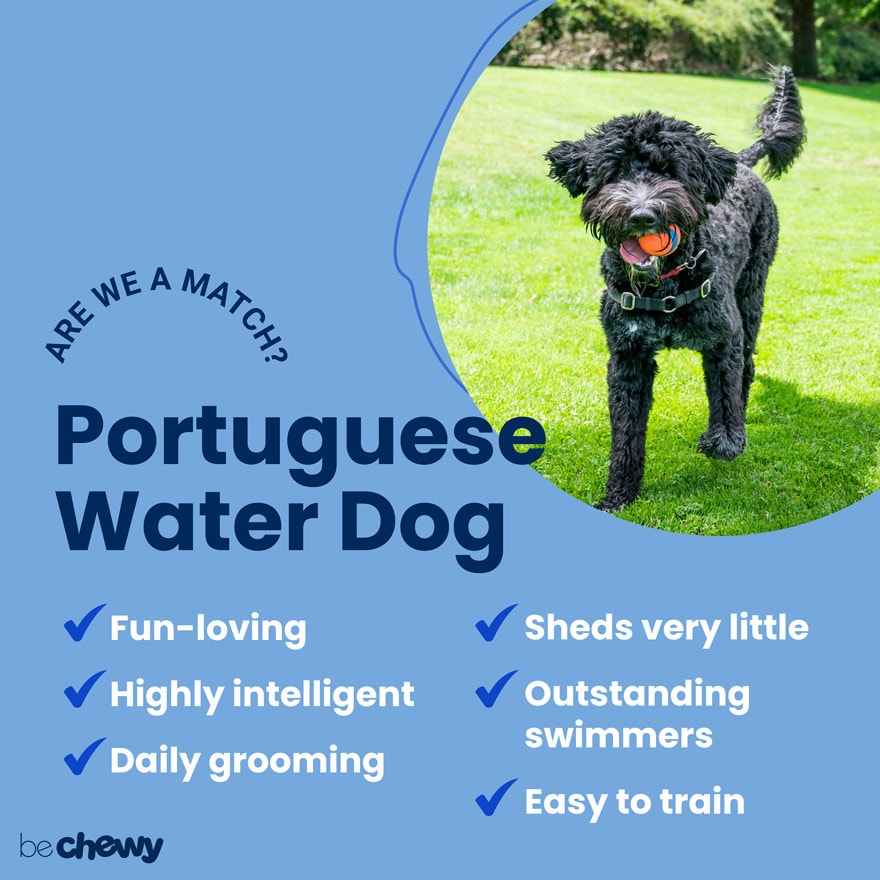
Top Takeaways
Friendly and loyal, Portuguese Water Dogs are a highly active breed who make fun companions for active pet parents. They thrive as members of an always-on-the-go family who spends lots of time outdoors and, ideally, in the water. This type of mental and physical exercise paired with proper training brings out the best in them.
Expert input provided by veterinarian Carly Fox, DVM, staff doctor at Animal Medical Center in New York City, and certified dog behaviorist and trainer Russell Hartstein, CDBC, CPDT-KA, Fear Free Certified, founder of Fun Paw Care Dog Training in Los Angeles.
Breed characteristic ratings provided by veterinarian Dr. Sarah J. Wooten, DVM, CVJ, a veterinarian at Sheep Draw Veterinary Hospital in Greeley, Colorado; dog trainer and behavior consultant Irith Bloom, CPDT-KSA, CBCC-KA, CDBC, owner of The Sophisticated Dog, LLC, in Los Angeles; and certified animal behavior consultant Amy Shojai, CABC, in Sherman, Texas.
The health content was medically reviewed by Chewy vets.

Search for Adoptable Portuguese Water Dogs Near You
Top Portuguese Water Dog Names
These are the top Portuguese Water Dog names as chosen by Chewy's pet parents!
Female Names
- Luna
- Bella
- Pepper
- Piper
- Winnie
- Rosie
- Stella
- Lucy
- Penny
- Olive
Male Names
- Tucker
- Charlie
- Leo
- Finn
- Milo
- Bear
- Gus
- Rio
- Murphy
- Ollie
Share:

